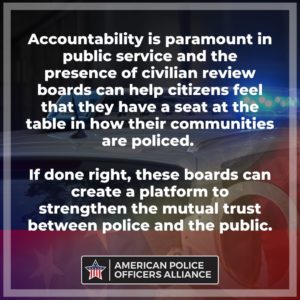Since the Summer of 2020, the national conversation around law enforcement has increasingly focused on building trust and maintaining transparency with the public. Activists, especially in urban areas, have maintained that there is a disconnect between police departments and the communities they serve, which has led to distrust from the people and abuses of power from authorities.
At its root, this argument maintains that an imbalance of power leads to a lack of accountability with the public. One solution police reform advocates offer for this alleged structural imbalance is the implementation of civilian police review boards.
Our organization has covered these boards extensively, both in current event articles and a page dedicated to outlining what we view as some of the downfalls of these entities. At their worst, we believe police review boards can be political hotbeds-agenda driven bodies which often work to commandeer control over law enforcement and don’t treat all officers equally in their review process. But can civilian review boards, at their best, accomplish the aims laid out by their proponents?

In Albany, New York, proponents including former law enforcement officers, say “yes.” One such advocate is former Albany Police Chief Brendan Cox.
In a May interview with Spectrum News 1, Cox expressed the need to build relationships between the community and law enforcement:
“If we don’t build relationships and have the community ready to stand up when something happens, violence is going to continue because it’s going to be that much harder to get someone off the street that is committing violence,” he said.
The article notes that Cox recently participated in a panel discussion at the University of Albany on the benefits of civilian review boards.
“I think people just want accountability. They want transparency, they want to know what’s happening,” he said.
Albany had a civilian review board when Cox had been chief, which is now being brought back, the article reports. Still, advocates recognize that civilian review boards are not the sole solution to America’s crime problems, or the frayed relationships on the ground between police and citizens in some communities.
“We have a ridiculous issue with poverty…mental illness, substance abuse, trauma. Those four issues right there, those need to be addressed, and the criminal legal system can’t address those,” he acknowledged.
Ultimately a balance must be struck. Review boards can be an outlet for a community which feels underrepresented or unheard. Of course, accountability is paramount in public service and the presence of these boards can help citizens feel that they have a seat at the table in how their communities are policed. If done right, these boards create a platform to strengthen the mutual trust between police and the public, and that’s a good thing.









